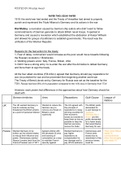Class notes
CIE AS LEVEL History 9489: The League of Nations and International Relations in the 20s
- Course
- Institution
In-depth notes about the international option for CIE AS LEVEL history . This contains Unit 2 only about the League of Nations and International Relations in the 1920s. Contains key dates, perspectives and significance of events
[Show more]



